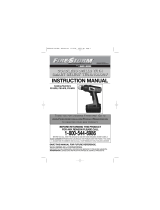INSTRUCTION MANUAL
BEFORE RETURNING THIS PRODUCT FOR ANY REASON PLEASE CALL
1-800-544-6986
BEFORE YOU CALL, HAVE THE CATALOG No. AND DATE CODE AVAILABLE . IN MOST CASES, A
BLACK & DECKER R E P R E S E N TATIVE CAN RESOLVE THE PROBLEM OVER THE PHONE. IF YOU HAV E
ASUGGESTION OR COMMENT, GIVE US A CALL. YOUR FEEDBACK IS VITA L TO BLACK & DECKER.
WA R N I N G : When using electric tools, basic safety precautions should always be followed to reduce the risk of fire, electric shock, and personal
injury including:
1. Never attempt to open the battery for any reason. If the housing of the battery breaks or cracks, immediately discontinue use and do not
r e c h a r g e .
2. Do not incinerate the batteries. They can explode in a fire.
3. A small leakage of liquid from the battery cells may occur under extreme usage, charging or temperature conditions. This does not indicate a
failure. However, if the outer seal is broken and this leakage gets on your skin:
a) Wash quickly with soap and water.
b) Neutralize with a mild acid such as lemon juice or vinegar.
c) If the battery liquid gets in your eyes, flush them with clean water for a minimum of 10 minutes and seek immediate medical attention.
MEDICAL NOTE: The liquid is a 25-35% solution of potassium hydro x i d e .
4. Charge batteries only with Black & Decker / Firestorm 18 V Slide Pack Chargers.
5 . DO NOT charge the powerpack in an air temperature below 40°F or above 105°F. This is important and will prevent serious damage to the
power pack. Longest life and best performance can be obtained if the power pack is charged when the air temperature is about 75°F.
6. DO NOT probe pack with conductive objects.
7. Read manuals originally supplied with charger and tool before charging and using this battery.
Important Charging Note
The batteries should be recharged when they fail or produce sufficient power on jobs which were easily done previously. DO NOT CONTINUE to
use the tool with its batteries in a depleted condition.
The RBRC™ Seal
The RBRC™ (Rechargeable Battery Recycling Corporation) Seal on the nickel-cadmium battery (or battery pack) indicates that the
costs to recycle the battery (or battery pack) at the end of its useful life have already been paid by Black & Decker. In some areas, it is illegal to
place spent nickel-cadmium batteries in the trash or municipal solid waste stream and the RBRC program provides an environmentally
conscious alternative.
RBRC in cooperation with Black & Decker and other battery users, has established programs in the United States and Canada to facilitate the
collection of spent nickel-cadmium batteries. Help protect our environment and conserve natural resources by returning the spent nickel-
cadmium battery to an authorized Black & Decker service center or to your local retailer for recycling.You may also contact your local recycling
center for information on where to drop off the spent battery, or call 1 - 8 0 0 - 8 - B AT T E R Y.
Battery Cap Information
Battery storage and carrying caps are provided for use whenever the battery is out of the tool or charger. Remove cap before placing battery in charger or tool.
WA R N I N G : Do not store or carry battery so that metal objects can contact exposed battery terminals. For example, do not place battery in aprons,
pockets, tool boxes, product kit boxes, drawers, etc. with loose nails, screws, keys, etc. without battery cap. Transporting batteries can possibly cause
fires if the battery terminals inadvertently come in contact with conductive materials such as keys, coins, hand tools and the like. The US Department
of Transportation Hazardous Material Regulations (HMR) actually prohibit transporting batteries in commerce or on airplanes (i.e. packed in suitcases
and carryon luggage) UNLESS they are properly protected from short circuits. So when transporting individual batteries, make sure that the battery
terminals are protected and well insulated from materials that could contact them and cause a short circuit.
S AVE THIS MANUAL FOR FUTURE REFERENCE.
See ‘Tools-Electric’
– Yellow Pages –
for Service & Sales
Black & Decker (U.S.) Inc.,
701 E. Joppa Rd.
Towson, MD 21286 U.S.A.
Battery Cap
Capuchon du bloc-pile
Protector de la batería
Cat #s. FS180BX, FS18SBX, FS18BX Form # 90501024 REV. 1 (JUN. ‘06) Copyright © 2006 Black & Decker Printed in China
CONSERVER CE MANUEL POUR UN USAGE ULTÉRIEUR.
AV E R TISSEMENT : pour l’utilisation d’outils électriques, toujours suivre des mesures de sécurité de base afin de réduire le risque d’incendie, de choc
électrique et de blessures corporelles, notamment : 1. Ne jamais tenter d’ouvrir la batterie, pour quelque raison que ce soit. Si le boîtier de la pile se brise
ou se fissure, interrompre immédiatement son utilisation et ne pas la recharger. 2. Ne pas incinérer les piles. Elles pourraient exploser dans un incendie.
3. Une petite fuite de liquide peut se produire dans les cellules de pile en cas d’utilisation extrême, de charge ou de conditions de température. Cela
n’indique pas de défaillance. Toutefois, si le joint d’étanchéité extérieur est rompu et que la fuite de liquide entre en contact avec la peau : a. Lavez
rapidement la zone touchée au savon et à l’eau. b. Neutralisez avec un acide doux comme du jus de citron ou du vinaigre. c. Si le liquide de la batterie
entre en contact avec les yeux, rincez-les abondamment à l’eau propre, pendant un minimum de 10 minutes, puis obtenez des soins médicaux.
REMARQUE MÉDICALE : le liquide est composé d’une solution de 25 % - 35 % d’hydroxyde de potassium. 4. Rechargez les piles uniquement
avec les chargeurs de blocs-piles Black & Decker / Firestorm 18 V. 5. NE CHARGEZ PAS le bloc-piles à une température ambiante inférieure à 5°C

